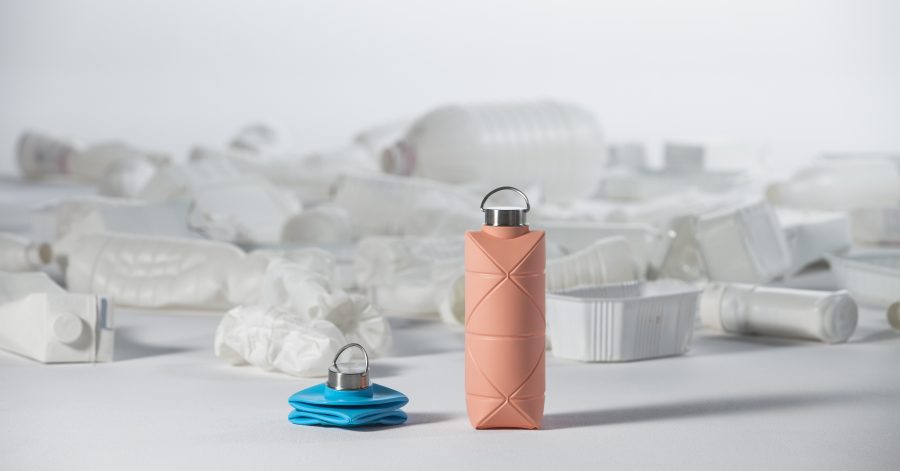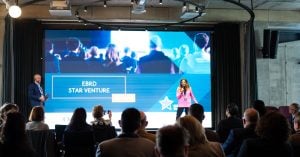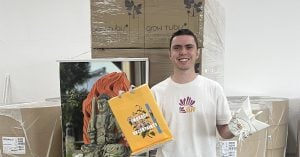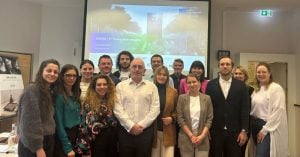On July 3rd, the EU ban on single-use plastics will come into force across member states. The aim is to fight against plastic pollution and especially marine litter. And since 5 of the 10 items on the list are packaging products, the new legislation raises the bar high for packaging manufacturers, distributors, and FMCG producers, to speed up green innovations in the space.
In this series, The Recursive explores single-use plastic alternatives . Each article will tell the story of a SEE-based startup that is innovating in the space of sustainable packaging. We will discover their unique approaches to replacing single-use plastics, their ambitions for the future, but also the challenges they are facing along the way.
We kick it off with DiFOLD, the company producing a reusable origami bottle, based in Sofia, Bulgaria. One of the biggest issues with single-use items is the throwaway culture that they have built. Disposable packaging encourages a linear flow of resources, whereby raw materials and products are quickly discarded as waste. DiFOLD supports the reusability revolution, using proprietary technology to create long-lasting, safe packaging products that reduce resource consumption and waste.
On Friday, read the story of ReVive, a Romanian startup distributing biodegradable, compostable and recyclable products.
The Recursive: How did you come up with the idea for a reusable origami bottle?
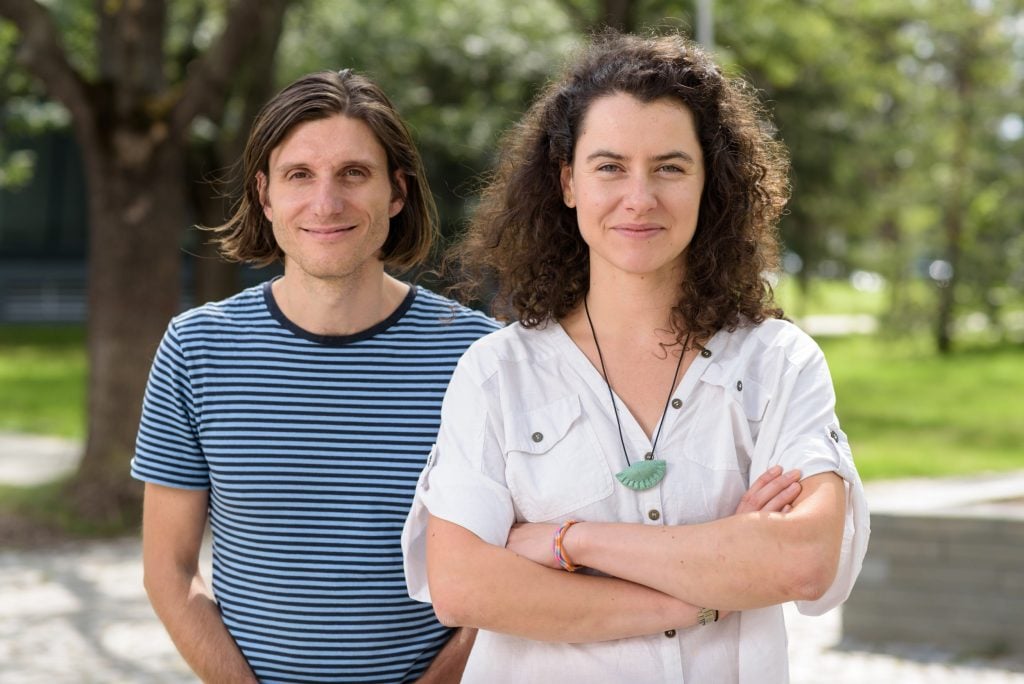
Radina Popova: We started three years ago from the foldable designs that Petar discovered. Unlike most start-ups, we didn’t have a specific problem or need that we wanted to solve. We had our abstract foldable designs (DiFOLD’s design technology) and we started looking at its applications and the value it can bring. We had a gut feeling that we could solve problems in the packaging space. So we went through deep hands-on research, meeting with different stakeholders. If we really want to solve the problem with the single-use, disposable culture, then we must rethink how packaging is designed and used. Reusable packaging is a $10 billion innovation opportunity, according to Ellen MacArthur Foundation. We can be part of this transformation by offering a new category of more practical foldable reusable packaging and containers that can be used for zero waste shopping.
DiFOLD Origami Bottle is our first product – a novel collapsible water bottle and a lifestyle product. It sets the stage for other reusable foldable containers to be created, also in the packaging space where we aim to have a bigger impact.
Petar Zaharinov: I came across the foldable principle in 2013 and I first thought that it was already invented. The invention itself is the presence of only 4 elements (polygons) along the circumference of the tubular. In this way, in an unfolded state, the structure stays stable and rounded naturally. The folding mechanics are different from other foldable bottles out there and it gives the product more stability.
What markets will you be serving, now and in the future?
Radina Popova: It’s difficult to directly enter the bigger B2B market for packaging and zero waste shopping when you don’t have a product that demonstrates your technology. Therefore, we decided to create the DiFOLD Origami Bottle. With it, we are building a community of early adopters that starts the #ReUseReFold Revolution that we aim to create. The product also showcases our design technology and serves as a “proof of concept”. It demonstrated that we can develop similar foldable reusable containers for big brands. So, imagine CPG brands like Nestle, Unilever, and Procter & Gamble, with very bold sustainability goals about their packaging – we could help them develop more convenient, easy-to-carry reusable packaging that they could integrate into their sustainability practices. Our work with them will be like an open innovation project where we can create and prototype the product and then move to a licensing model where we get royalties for the reusable packaging deployed. Big companies usually have their own manufacturing networks and can take on production themselves.
Tell us more about your first product aiming to serve as a single-use plastic bottle alternative?
Radina Popova: DiFOLD Origami Bottle is a 750 ml reusable water bottle that has the secret power to fold at 80% in volume, thus fitting even in your pocket when empty. At the same time, it is ultra-stable and sturdy when unfolded, like no other collapsible bottle.
Petar Zaharinov: The materials used are carefully researched and tested. We put safety first, so there is no chemical migration or microplastics from the polymer used for the body, it’s also certified for food safety and can resist hot temperatures. Secondly, we looked at durability. People think that bottles that fold do not last very long. This is not the case with our product. The current material is high-end and very durable. The third factor is sustainability. Plastic often has a negative connotation, but it’s also a fantastic material – it is lighter, durable and premium types of polymers can be recycled in a closed-loop. In our case, the material is 43% bio-based, meaning that it contains plastic sourced from renewable biomass (rapeseed) and can be recycled multiple times, without a significant loss in quality. We also designed and engineered DiFOLD in a way that can be closed-loop recycled and we plan to have collection-back policies for old bottles, recycle and turn them into raw materials for new bottles.
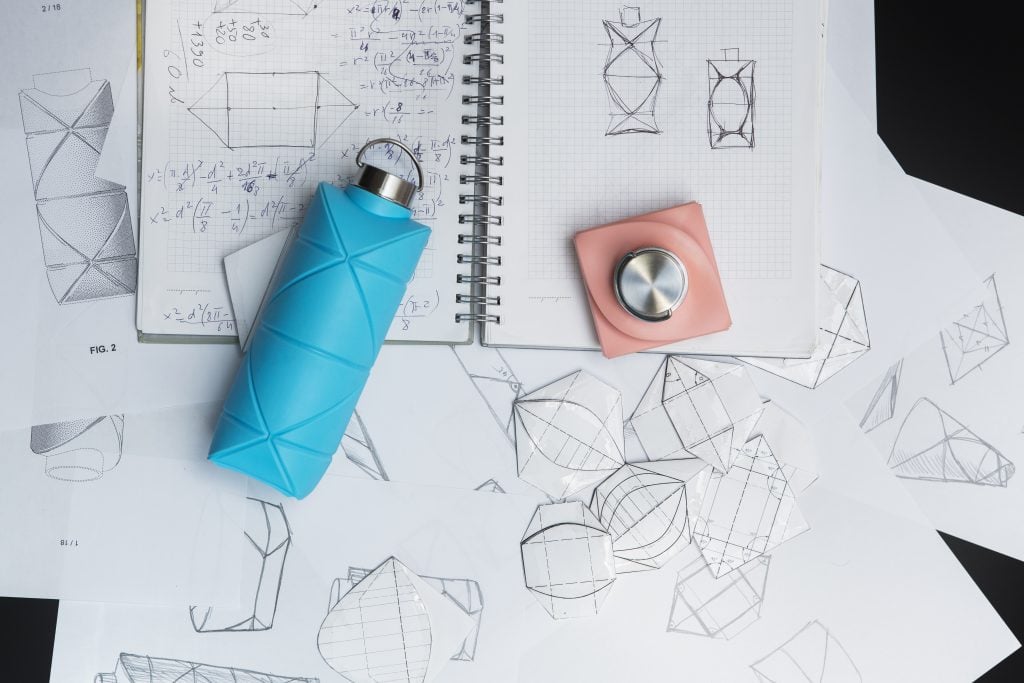
How does your supply chain work?
Radina Popova: We are based in Sofia, Bulgaria. This is where the concept is born and where we run our business from. Before moving to production, we went through a lot of research – prototyping and looking for manufacturing technologies. We looked for manufacturers in Bulgaria, but it was difficult to close the whole production cycle here at the time. Two years ago, I had the opportunity to travel to China and I met with several manufacturers there. We decided to set up production in China due to the costs and the opportunity to scale. There is also a logistics advantage because the first target market where we want to focus is the US and shipping is more convenient from China. However, we are considering the option to have a second production somewhere in Europe in the future.
How did you fund your business?
Radina Popova: So far, we’re the typical work hard bootstrapped start-up. We had a small angel funding in 2020 in order to do our crowdfunding campaign and invest in pre-production. Then with our crowdfunding campaigns, we raised $190K in pre-orders, thus funding the production of the Origami Bottle. We have more than 3,300 backers from more than 70 countries worldwide from the Kickstarter and IndieGoGo campaigns that we ran last year. We worked a lot on the execution of the Kickstarter that was the main campaign. It was a result of serious work, not a lucky outcome. You need to prove that you have something that is innovative and ubiquitous for these platforms. You also need to have reached a certain level of readiness with the product and show that you have thought of the whole production journey, and you have a specific timeline. You need to build trust with potential supporters.
We started developing the campaign in January and we launched in mid-June last year. We did an intensive pre-campaign lead generation, testing different targeting for performance marketing, getting people excited about the launch. And it’s of course about the execution of the campaign itself, which is how you tell your story in a way that fits the Kickstarter community. We worked with an ad agency for performance marketing, which was specifically focused on crowdfunding campaigns. We did the PR ourselves because it’s important to get noticed by relevant media and drive traffic. We also did a lot of community management. Overall, we put our hearts and souls within the limited resources that we had!
What key lessons did you learn along the journey?
Radina Popova: We had a lot of learning on the production side. It is probably the most difficult part so far. After you have a successful crowdfunding campaign, you have a lot of people waiting for your product. Our initial promise was to ship these bottles last year, yet six months later we are not ready with this. There were some unexpected challenges. For instance, we had to learn how to work with factories and to make sure we track the sourcing of the raw material. Also, there’re a lot of technical challenges that we’re dealing with. Bringing your pre-production samples to mass production is a long process. You need to really optimize the production processes, matching your own requirements with those of the factories.
What advice would you give entrepreneurs looking to innovate in an emerging space?
Radina Popova: The most uncertain things that can happen will require a lot of persistence and strong belief to continue no matter what. Everything can go wrong, and many things will go wrong. And that’s okay. And if you really believe in this and you are working hard, you will go through whatever obstacles. It’s part of the journey.
Petar Zaharinov: Also, if something works, don’t change it. Because at this stage every additional radical change increases the complexity. Stick to the things that work well.
Thank you for reading the story of DiFOLD. If you know any startups in SEE, working on sustainable packaging innovation, drop us a line at [email protected].

